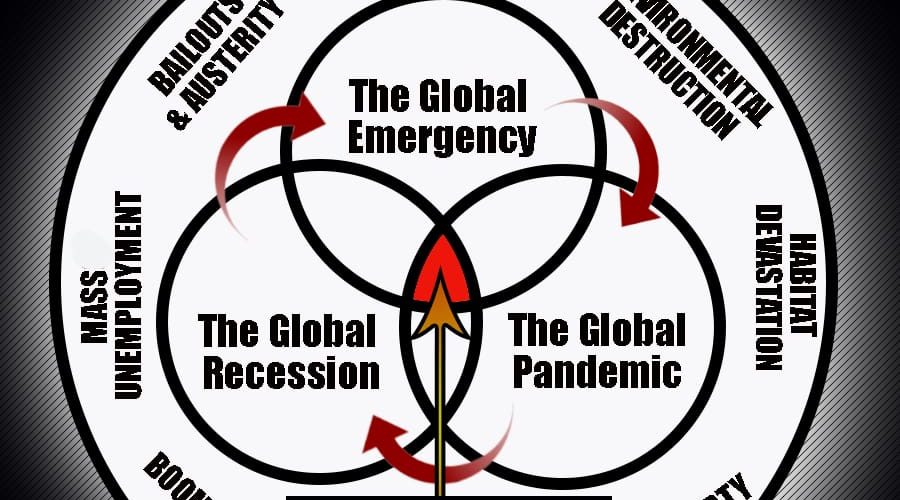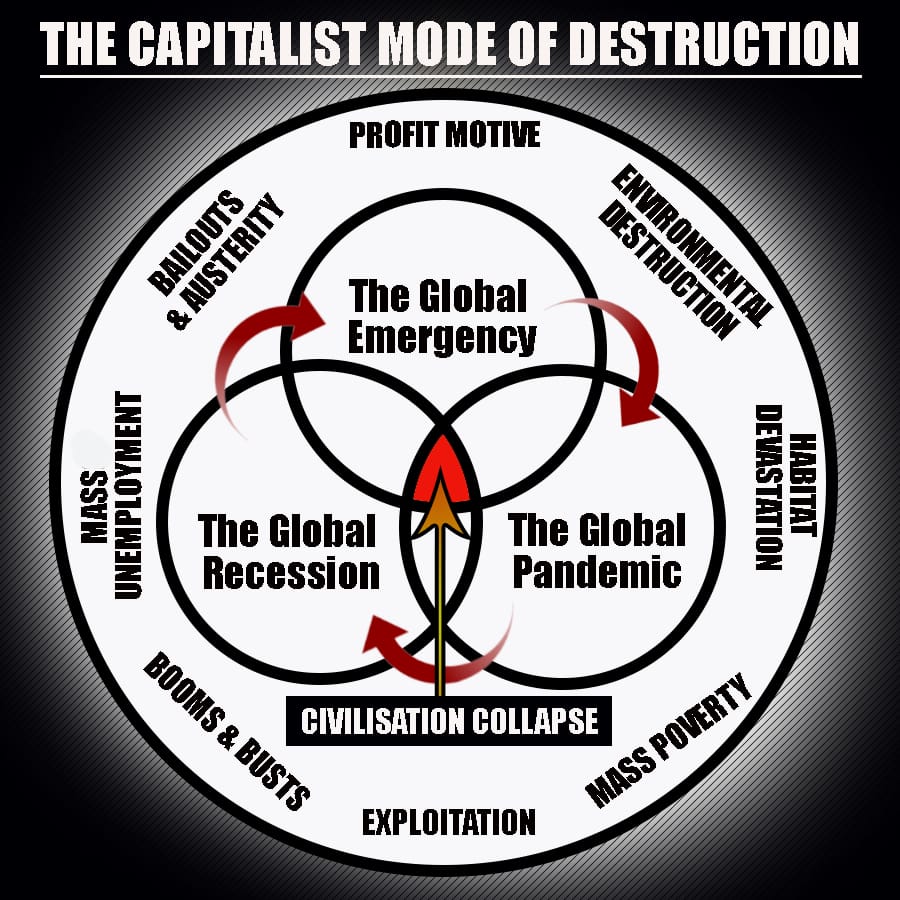The great global crises (they come in threes)
On Thursday 12 March many of us watched Leo Varadkar announce (in Washington) “the closure of schools, pre-schools and further and higher education settings for a period until 29 March 2020, to support efforts to contain the spread of covid-19.”
No-one was prepared for the abrupt adjustments that we as a society have had to make. What began in China a number of months ago has now swept across the globe, forcing most countries to restrict movement across borders and cease non-essential economic activities. It is estimated that 1.7 billion people in the world are now living under some form of confinement,[1] and this number has the potential to increase even further. While efforts to contain the virus and slow down the number of infections are continuing day by day, week by week, the lives of more and more people have come to a standstill, waiting out the storm.
At this point the length and severity of the pandemic is still unknown, and therefore many of us are just lying low, waiting for that famous curve to flatten so we can get back to normality—a normality that, in the middle of this spring season, was once the only norm we could envisage, where routine and custom would repeat for another year.
All this has changed; but perhaps that is what was needed. We now have three global crises converging, which will stretch humanity’s resilience to the limit. All are interrelated, and all have their origin within the capitalist mode of production, with its insatiable drive for profit.
The global pandemic, the global recession and the global emergency that we are experiencing stem from the capitalist mode of production, which is the dominant mode of production on this planet.
Climate change has been well documented and has been studied for decades. (My previous article in the March issue covers this.) Year after year, as warning signs and alarm bells were being triggered, governments around the world failed to take any serious collective action to try to transition economies to more environmentally sustainable ones, the reason being that capitalist economies cannot function without expanding growth—the covid-19 crisis has proved that. With the necessity of capitalist growth, more land, more resources and more labour have to be exploited.
With profit incentives for the industrialisation of agriculture and monocrops, and the urban sprawl for human settlement, the devastation of nature and the destruction of the habitats of many species are an inevitable result. This destruction of nature means that humans “are creating the conditions for the spread of diseases by reducing the natural barriers between host animals—in which the virus is naturally circulating—and themselves . . . We fully expect the arrival of pandemic influenza; we can expect large-scale human mortalities.”[2]
These are the consequences we face when we fail to act on the global environmental emergency and continue to destroy our natural world. Who knows how many more outbreaks will be unleashed in the coming years, and the further crises they may cause? And we are the ones who will have to pick up the tab for those who profit from the existing system. That is why we should no longer think of capitalism as a mode of production—because the system is no longer a net producer: on a global scale it is destroying more than it can produce or replenish and so should be labelled the capitalist mode of destruction.
What we know is that the covid-19 pandemic is accelerating what some economists are predicting will be the “greatest depression” in living memory. “The financial crisis and Great Depression took three years to play out,” a headline in the Guardian reads; “this crisis has taken three weeks.”[3]
All economic indicators have plunged to what is being described as an I-shaped downturn, the absolute plummeting of financial markets and the real economy. This is illustrated in the graph of the purchasing managers’ index (PMI), showing “the economic activity indicators which are recording all-time lows of contraction for March.”[4] However, the global capitalist economy was already in decline, and a recession was forecast to hit in 2020; it’s just that the pandemic has caused economies to collapse much faster and to have a wider reach than expected.
The covid-19 pandemic is giving us an insight into the types of crisis that will become more common because of the global environmental emergency and the changes to the Earth System ushered in by the capitalist mode of destruction. These may range from pandemics to weather crises, such as the fires in Australia and extreme snow events, all of which have the ability to fundamentally affect supply chains for food and water and other essential goods. It is the sheer scale and frequency of crises that we will have to plan for and manage.
Ironically, where governments have been successful in dealing with the pandemic it has been in socialist countries, where the state has acted in a planned and organised manner, taking the necessary measures to shut down the economy in order to save lives, rather than to save the interests of the capitalist class, as is done in capitalist countries.
What has been clearly revealed to many people through their lived experience, all over the globe, is the obvious failure of capitalism to meet the challenge of the crisis.
So we have seen an increase everywhere in governments intervening in the economy, from nationalising health services to planning and directing production, trying to resolve the unfolding crisis. However, they do so with half measures, with one eye on the crisis and one on the economy. By doing so they will prolong people’s seclusion, thereby stretching essential services to breaking-point, increasing the mortality rate in each country, and so further deepen the impact of recession.
Once again it has not only revealed the anarchic nature of the system but even in such a dire crisis as this they are putting their very short-term interests before anyone and anything else.
Moreover, it has exposed the myth of the supremacy of the market in meeting our collective human needs, as we witness profit-seekers in every industry implementing insidious practices, such as price-gouging on essential goods and services and the laying off of large sections of their work force without any protection or compensation. Big Pharma is stunting the collective research and study to find medicines and vaccines for the virus by seeking to create patents for profit.
The crisis has also revealed to people what a decade or more of cuts in funding, recruitment, pay and conditions will do to essential services, such as health.
However, this is not just a crisis in the health service and our ability and resources to deal with this particular crisis but reveals a fundamental lack of investment and downgrading of the public system as a whole, including health, housing, education, and welfare. The virus has exposed our vulnerability to mass illness; but we also know that there already existed a crisis in our public systems before this pandemic, resulting from the austerity policies that governments have been implementing since the great recession of 2008.
Their strategy remains as a planned policy of hoodwinking people to push them towards a private-service model, whether that be through a private-rental housing market, dominated by vulture and monopoly funds buying up housing stock, private health, increased costs in education, or privatised child care.
In times of crisis, when the private market cannot function, we see a settlement made by the private sector to be taken over by the state. The state, however, is not an arbitrary actor: it is an instrument of class rule, whereby the arms of the state protect the interests of the ruling class.
Nationalising under the capitalist mode of production, especially when directed by capitalist governments, is not a transitioning of the economy towards a socialist mode of production, as some on the left would have us believe, but a calculated policy of the ruling class to protect their private interests and place the burden on the taxpayer in times of crisis.
Key industries get massive bail-outs, using public funds, yet the shareholders will still receive their expected dividends, and in time the industry will be sold back at fire-sale prices, a practice we saw following the great recession. In other words, the public will take on all the risk while the private owners reap all the rewards.
Yet the crisis has revealed that those who we truly value and need most are the workers in health, retail, child care, education, and cleaning (among others), and not those who live off the labour of others: the landlords, the capitalist owners, the shareholders, and all those who seek to profit from this health crisis. The wealthiest people on this planet, the billionaires and their companies, are either hiding out in luxurious bunkers or asking for bail-outs from the public purse.
All of a sudden the people’s attention has been turned towards how the system actually functions and how it is geared towards protecting the interests of the ruling class, which no propaganda can hide. The next global economic crisis is now under way. The Marxist economist Michael Roberts states that “the world economy was already slowing down towards a new slump before COVID-19 hit. The pandemic was a trigger that exposed the underlying flaws in the capitalist mode of production. Production, investment and employment under capitalism undergo recurring crises that lead to periodic slumps which destroy the livelihoods (and lives) of billions.”[5]
The three major global crises that are now accelerating are interrelated within the capitalist mode of destruction, and each one is potentially devastating for the strata of the working class and oppressed people, not on their own but all coming at once or in quick succession. Our ability to counter these crises, given the current policies and popular ideas lying around, will be catastrophic for all working people, their families and communities.
Do not be fooled by them. This pandemic is not the source of the economic crisis, nor is it to be racially placed at the door of the Chinese. It is a direct result of centuries of capitalist development, of booms and busts and the increasing destruction of the natural world, with the exploitation and urbanising of the global working and oppressed people. If extreme weather, a pandemic and a global depression were to happen all at once it could very well trigger a collapse of civilisation.
This is a wake-up call to humanity to take collective action and to seek to permanently change from the private (market, capitalist) mode to a public (planned, socialist) mode of production, where the ownership of the means of production is held in common by all citizens, each one of us being a shareholder in the development of our country.
A temporary compromise to appease private capital will achieve nothing for the working strata but in fact, as the last recession demonstrates, where the Irish state took on 42 per cent of all EU banking debt, will further make the people pay for the crisis of capitalism and its benefactors.
We must not settle for temporary appeasements but in fact must strive to transform these policies from temporary arrangements into permanent solutions in our own interest. We cannot depend on any government to do this: it must come from a popular movement, awakened by the new reality and led by a class-conscious movement unwilling to capitulate to private vested interests.
To equip ourselves for the struggles ahead, given the reality of the three global crises unfolding before us, the following can become the centres of struggle for popularising working-class demands among the working strata, with the ultimate goal of ending the capitalist mode of destruction once and for all:
1. All-Ireland Universal Public Plan
Funding and expanding universal health, housing, education, welfare and infrastructure systems.
2. All-Ireland Environmental Plan
A united and strategic approach for a rapid transition to an environmentally sustainable economy.
3. All-Ireland Industrial and Financial Plan
A strategy whereby the full-scale nationalisation of banks and industry is created for full employment, in line with the environmental plan.
1. Michael Roberts Blog, “Lockdown!” 24 March 2020 (https://tinyurl.com/jntr3uk).
2. John Vidal, “‘Tip of the iceberg’: Is our destruction of nature responsible for covid-19?” Guardian (London), 18 March 2020 (https://tinyurl.com/u9suffv)
3. Nouriel Roubini, “Coronavirus pandemic has delivered the fastest, deepest economic shock in history,” Guardian (London), 25 March 2020 (https://tinyurl.com/v7we8cm)
4. Michael Roberts Blog, “Lockdown!” 24 March 2020 (https://tinyurl.com/jntr3uk).
5. Cihan Aksan and Jon Bailes, “COVID-19 and capitalism,” State of Nature, 27 March 2020 (https://tinyurl.com/uqtq672).







